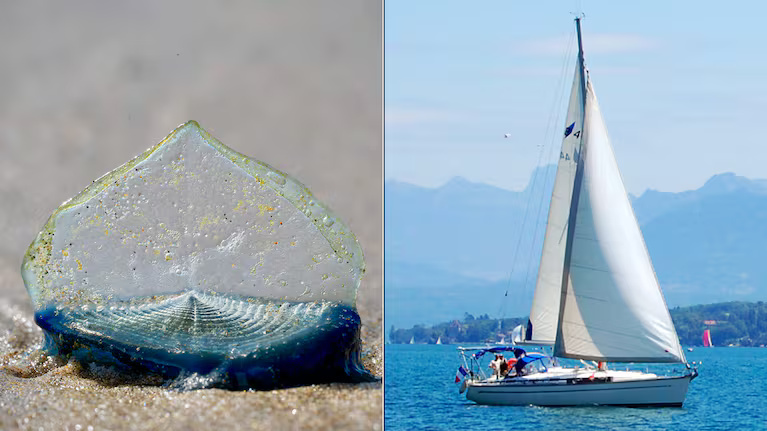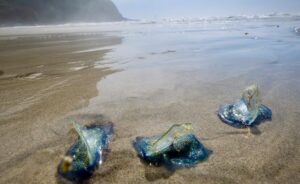
By WINSTON SZETO/Oregon Public Broadcasting
Photographer Robin Loznak and his wife, Carisa Cegavske, of Elkton are longtime fans of “The Lord of the Rings.”
So when they made a nearly 60-mile trip to the Hobbit Trail south of Yachats in late June they enjoyed every step of the scenic path that winds through lush forest before opening up to the beach.

But the beauty of the trail wasn’t the only thing that caught Loznak’s attention.
On the beach, he stumbled upon something unexpected — sea creatures that stirred a personal memory of his late father, a sailor who had spent his retirement circumnavigating the globe in a small boat before passing away about 10 years ago.
Velella velella — also known as “by-the-wind sailors” — are small, jellyfish-like creatures that regularly wash ashore in spring and early summer along the Pacific coast, from British Columbia to California. Beachcombers often encounter thousands, even millions, of these striking, electric-blue organisms stranded in the sand.
“We saw 50-100 Velella velella on the beach just washed up (by) the tides,” Loznak said. “They definitely catch your eyes when you see them — they’re really vibrant blue-colored … and they have a little sail that comes up in an inch or so.”
“The name of (my father’s) sailboat was Velella,” he continued, “which, I thought, was really appropriate, because the way the Velella … they’re just this traveling creatures that just floats upon the top of the ocean, and they’re at the will or at the mercy of the winds and the waves.”
These seasonal strandings are not random; they result from predictable environmental patterns involving wind, ocean currents and warming sea temperatures.

Matthew Bracken, a professor of ecology and evolutionary biology at the University of California, Irvine, explained the phenomenon to NPR: “It’s almost like a wave that starts in the north and moves toward the south as the system transitions to predominantly onshore-type winds. And when that happens they get blown and then they get stranded.”
The winter winds along the West Coast typically blow from the south. But in April, the pattern reverses, shifting to a north-to-south direction. That change drives massive numbers of Velella velella ashore.
In years with warmer-than-average winters, conditions become especially favorable for these creatures. According to University of Washington researchers, calm seas and elevated surface temperatures allow the colonies to thrive and bloom in large numbers offshore. When the spring winds turn onshore, those colonies are carried en masse to the beaches.
While especially common on the West Coast, Velella velella strandings have also been reported on the western shores of Ireland, England, France and other temperate coastal regions.
Although they resemble jellyfish, Velella velella are not true jellyfish. Each organism is actually a colony of tiny polyps that float at the surface of the ocean. They use a triangular sail to catch the wind and trailing tentacle-like structures below to feed.
They’re often mistaken for the more dangerous Portuguese man o’ war due to their vivid blue coloring, but Velellas are much less harmful. While both species use stinging cells called nematocysts to capture prey, the Velella’s sting is harmless to humans — though it can be irritating to sensitive skin.
Loznak said he had previously seen similar strandings near Astoria on Oregon’s north coast. But even though he didn’t believe the creatures were toxic, he chose not to touch them.
“I didn’t think they were toxic to touch like a Portuguese man o’ war, but I wasn’t 100% sure, so I did not touch them,” he said. “I don’t think touching them is necessarily appropriate either because … I didn’t have any hand sanitizer with me at the moment.”
Oregon State University’s Hatfield Visitor Center advises caution. While touching Velella velella generally isn’t dangerous, people should avoid rubbing their eyes or putting their hands in their mouths afterward, as it could cause pain or more serious issues. The center also recommends not walking barefoot through freshly stranded Velellas.

If you find yourself walking along the beach in Oregon and you see a glittering field of tiny blue sails marooned in the sand, you’re witnessing more than just an unusual natural event — you’re seeing the result of seasonal ocean dynamics and, for some, a deeply personal connection to the sea.
“It makes me think of my father when I see them,” Loznak said.
- This story originally appeared July 5, 2025 on Oregon Public Broadcasting.




















